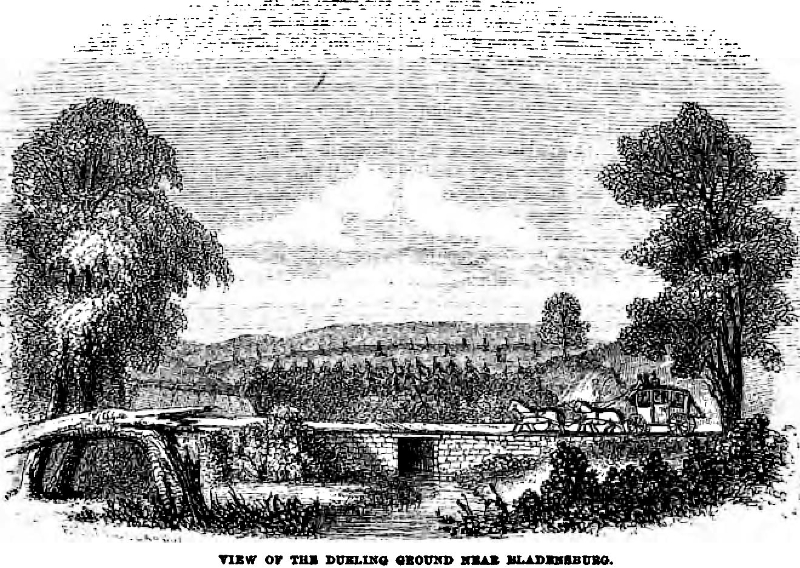On 28 November 1818, John McCarty of Loudoun County wrote a short letter to the Speaker of the House of Delegates of Virginia, declining the seat he had recently been elected to in that body. The reason? Since his election, he had accepted a challenge from his cousin, U. S. Senator Armistead T. Mason, and would therefore be unable to take the required oath against dueling.
Arising from the practices of European nobility, for many years dueling was a surprisingly frequent occurrence in American life—and politics. In a society pervaded by ideas of honor and reputation, disputes that started in the political realm quickly turned personal, and it was far from rare for politicians to engage in so-called “affairs of honor;” the Hamilton-Burr duel is only one of the most famous examples.
Politics were also at the root of the disagreement between John Mason McCarty and his cousin, Armistead Thompson Mason. The two men already had an acrimonious political relationship, stemming from a contentious election where McCarty supported Federalist Charles Fenton Mercer over the Democratic-Republican Mason for a seat in the House of Representatives. Although Mason was selected to serve in the U. S. Senate, McCarty and Mason continued to take potshots at each other in the press, publishing numerous letters in the Leesburg newspaper The Genius of Liberty. In May 1818, the editor of the Genius published a series of letters between the two men, an act which led to the first rumblings of a duel.
However, Virginia outlawed dueling in 1810, in an act which also barred any person who had issued or accepted a challenge from holding office. Moreover, all those appointed to “any office or place, civil or military, under this Commonwealth” had to swear an oath that they had not been engaged in a duel since the passage of the act, and that they would not “be concerned, directly or indirectly, in such duel” during their time in office. At the time, Mason was serving as a brigadier general in the militia and McCarty was campaigning for a seat in the House of Delegates; neither could participate in a duel while holding these positions.
The matter came to a head after McCarty published his own booklet of letters between himself and Mason in September 1818, a pamphlet which made McCarty out as the “verbal winner” of the altercations. Perhaps apocryphally, Andrew Jackson is said to have spurred Mason on to duel when he encountered Mason reading McCarty’s pamphlet in a stagecoach returning from Richmond. In any case, after the pamphlet was published Mason resigned his militia commission and challenged McCarty.
McCarty was reportedly reluctant to engage in the fight, agreeing to it only when Mason’s seconds (close friends who helped arrange the duel) threatened to post a notice of his “cowardice” if he did not participate. He then accepted the challenge, penning the letter to the Speaker of the House of Delegates to refuse his seat. George Rust, Jr., was elected in his place. McCarty seems to have felt a continued reluctance, however; according to an article by Eugene Scheel, he originally suggested that the duelists should leap from the dome of the U.S. Capitol building, sit on a barrel of gunpowder and ignite it, or fight with dirks.
Ultimately the two men fought with single-shot muskets at ten paces at the Bladensburg dueling grounds in Maryland, a site which saw over fifty duels fought between 1808 and 1868. They met there on 6 February 1819. McCarty was wounded in the left arm above the wrist. Mason was killed.
McCarty fled to New York City after the duel, but returned to Washington about a year later, eventually marrying the young woman he’d been engaged to before the duel.
Interestingly, McCarty’s nephew, Page McCarty, was involved in a famous Richmond duel with John Mordecai, although that duel was fought over a young woman named Mary Triplett rather than a fierce political rivalry. Page McCarty shot and killed Mordecai in the Confederate section of Oakwood Cemetery in 1873. Unlike his uncle John, who married and even reentered politics, Page McCarty lived the rest of his life in seclusion, avoiding society.
The letter sent by McCarty can be found in the Executive Communications of the Office of the Speaker, 1776-1864 (Acc. 36912). For more on dueling in Virginia, check out this entry from Fit To Print and this post by the Virginia Historical Society.
– Claire Radcliffe, State Records Archivist
















How about adding the name of the “young woman” McCarty eventually married? She was Ann Lucinda Lee, daughter of Thomas Ludwell Lee & Fanny Carter Lee, of Coton Farm, Loudoun County, Virginia.
Very interesting article. I had no idea that taking an oath to abstain from dueling was required for public service in VA! Just curious if Armistead T. Mason was related to George Mason?
Yes, actually! Armistead was a grand-nephew of George Mason.
John M. McCarty and Armistead T. Mason were 2nd cousins. Also McCarty’s older brother, William, married Emily Mason, Armistead T. Mason’s sister. There is a detailed article about the McCarty family and the duel in the Northern Neck of Virginia Historical Magazine, 2012 issue.